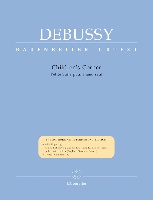Claude Debussy (born Achille-Claude Debussy) was among
the most influential composers of the late nineteenth
and early twentieth centuries. His mature compositions,
distinctive and appealing, combined modernism and
sensuality so successfully that their sheer beauty
often obscures their technical innovation. Debussy is
considered the founder and leading exponent of musical
Impressionism (although he resisted the label), and his
adoption of non-traditional scales and tonal structures
was paradigma...(+)
Claude Debussy (born Achille-Claude Debussy) was among
the most influential composers of the late nineteenth
and early twentieth centuries. His mature compositions,
distinctive and appealing, combined modernism and
sensuality so successfully that their sheer beauty
often obscures their technical innovation. Debussy is
considered the founder and leading exponent of musical
Impressionism (although he resisted the label), and his
adoption of non-traditional scales and tonal structures
was paradigmatic for many composers who followed.
The son of a shopkeeper and a seamstress, Debussy began
piano studies at the Paris Conservatory at the age of
11. While a student there, he encountered the wealthy
Nadezhda von Meck (most famous as Tchaikovsky's
patroness), who employed him as a music teacher to her
children; through travel, concerts and acquaintances,
she provided him with a wealth of musical experience.
Most importantly, she exposed the young Debussy to the
works of Russian composers, such as Borodin and
Mussorgsky, who would remain important influences on
his music.
Debussy began composition studies in 1880, and in 1884
he won the prestigious Prix de Rome with his cantata
L'enfant prodigue. This prize financed two years of
further study in Rome—years that proved to be
creatively frustrating. However, the period immediately
following was fertile for the young composer; trips to
Bayreuth and the Paris World Exhibition (1889)
established, respectively, his determination to move
away from the influence of Richard Wagner, and his
interest in the music of Eastern cultures.
After a relatively bohemian period, during which
Debussy formed friendships with many leading Parisian
writers and musicians (not least of which were
Mallarmé, Satie, and Chausson), the year 1894 saw the
enormously successful premiere of his Prélude à
l'après-midi d'un faune (Prelude to the Afternoon of a
Faun)—a truly revolutionary work that brought his
mature compositional voice into focus. His seminal
opera Pelléas et Mélisande, completed the next year,
would become a sensation at its first performance in
1902. The impact of those two works earned Debussy
widespread recognition (as well as frequent attacks
from critics, who failed to appreciate his
forward-looking style), and over the first decade of
the twentieth century he established himself as the
leading figure in French music—so much so that the
term "Debussysme" ("Debussyism"), used both positively
and pejoratively, became fashionable in Paris. Debussy
spent his remaining healthy years immersed in French
musical society, writing as a critic, composing, and
performing his own works internationally. He succumbed
to colon cancer in 1918, having also suffered a deep
depression brought on by the onset of World War I.
Debussy's personal life was punctuated by unfortunate
incidents, most famously the attempted suicide of his
first wife, Lilly Texier, whom he abandoned for the
singer Emma Bardac. However, his subsequent marriage to
Bardac, and their daughter Claude-Emma, whom they
called "Chouchou" and who became the dedicatee of the
composer's Children's Corner piano suite, provided the
middle-aged Debussy with great personal joys.
Debussy wrote successfully in most every genre,
adapting his distinctive compositional language to the
demands of each. His orchestral works, of which
Prélude à l'après-midi d'un faune and La mer (The
Sea, 1905) are most familiar, established him as a
master of instrumental color and texture. It is this
attention to tone color—his layering of sound upon
sound so that they blend to form a greater, evocative
whole—that linked Debussy in the public mind to the
Impressionist painters.
"L'âme Évaporée", is from Deux Romances (2
Romances), and was composed in June of 1885 and later
published in December 1891. This overwhelming melody is
based on a poem by Paul Bourget (1852-1935), extracted
from Confessions (1882).
Although this work was originally written for Piano and
Solo Voice (Chant), I created this arrangement for Oboe
& Concert (Pedal) Harp.





 Faire un don
Faire un don